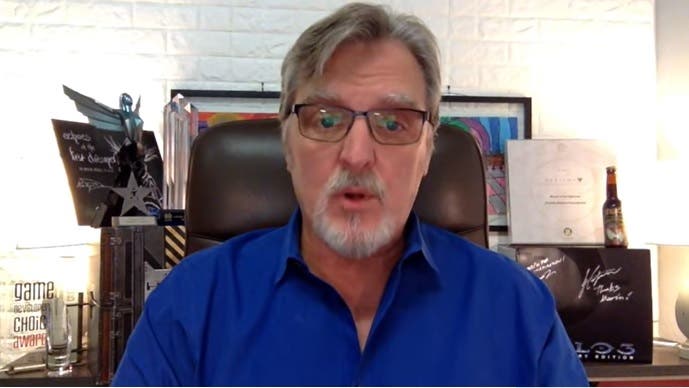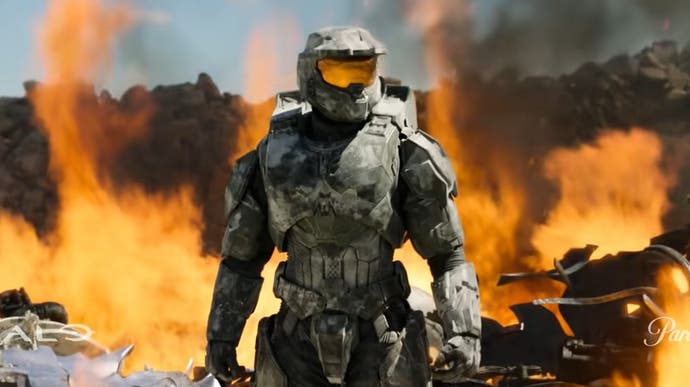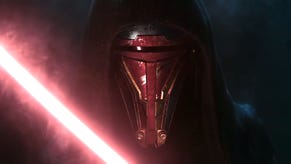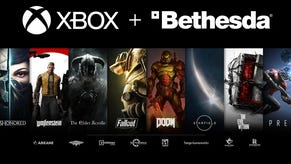Original Halo composers sue Microsoft over unpaid royalties dating back 20 years
Truth and reconciliation.
The original Halo music composers are suing Microsoft over unpaid royalties, Eurogamer can reveal.
Marty O'Donnell and Mike Salvatori, who created the iconic Halo music used in the Bungie-developed Halo games and more Halo products, claim Microsoft still owes them money relating to royalties dating back 20 years.
Lawyers representing the pair filed the lawsuit to a Washington state court in June 2020, and it has rumbled on ever since, with depositions and discovery undertaken. A date for mediation is set for next week, but if no agreement is reached, the dispute may go to court.
And in a recent development, O'Donnell and Salvatori have instructed their lawyers to explore the possibility of blocking the release of the upcoming TV show with a preliminary injunction.
O'Donnell and Salvatori are behind the creation of Halo's iconic soundtrack used on a raft of Halo games and products. This includes the famous Halo "monk" chant, as well as the rousing "der der der der" refrain Halo players know well.
Their lawsuit brought six causes of action against Microsoft: breach of contract; breach of fiduciary duty to develop the royalty income in a joint venture; breach of duty to act in good faith and fair dealing; failure to provide an accounting partnership; unjust enrichment; and tortious interference.
In a phone interview with Eurogamer, O'Donnell claimed he and Salvatori had tried to gain clarity from Microsoft for more than a decade on the alleged unpaid royalties, but finally decided to launch a lawsuit after failing to make progress with the company.
"We just never seemed, through our attorneys and even when I was physically in Microsoft, I could never get much clarity on it," O'Donnell said.
Microsoft declined to comment when approached by Eurogamer. Paramount failed to respond in time for publication.

O'Donnell says he and Salvatori, trading as O'Donnell Salvatori Inc., created and licensed the Halo music to Bungie - a deal that remained in place even as the company was bought by Microsoft in 2000, ahead of the launch of Halo: Combat Evolved a year later.
Microsoft's counterclaim seeks a declaration that the Halo music qualifies as work-for-hire and as a result Microsoft qualifies as the author of that work.
O'Donnell and Salvatori dispute this. "It was never work-for-hire," O'Donnell said. "It was always a licence deal. So that's what we did with Halo. With the first Halo music ever, that was written and recorded in 1999 for the first time. It was licensed to Bungie. Bungie didn't get bought by Microsoft for over a year."
In May 2000, O'Donnell became a Bungie employee, working as the studio's audio director. Salvatori, however, remained independent, working at O'Donnell Salvatori Inc. O'Donnell also remained part of O'Donnell Salvatori Inc.
"But at the time, the Halo music, for this very nascent beginning thing called Halo, was still owned by O'Donnell Salvatori and licensed to Bungie," O'Donnell said.

Just 10 days after O'Donnell became a full-time Bungie employee he became a full-time Microsoft employee when the company behind Xbox bought the company behind Halo. The composer claims contract problems began soon after.
"On day one of signing my employee contract, I wrote this addendum at the back where you're supposed to, and I said, by the way, the Halo music up to now is licensed, it's owned by O'Donnell Salvatore, Inc., and I'm an ASCAP (American Society of Composers, Authors and Publishers) composer. And that's the way it needs to be going forward.
"And immediately, I was segregated out from all the other people and I was shunted into a little room with Microsoft biz guys and attorneys or who knows what? And they wanted me to explain what I was talking about.
"And I told them, 'Look, what you bought was a licence deal for this music. They never had had an internal composer who wrote original music as an employee, so this was all new for them, too.
"And so I was like, 'Hey, if you guys can't handle this, no harm, no foul, I'll go back to Chicago and, you know, maybe I can freelance this stuff. I didn't know. But they said, 'Okay, we'll let you do ASCAP music and we'll deal with the licence later on this music, because like, how much of this music is going to be used in Halo?'
"This is 2000, so it's more than a year before we released. And I remember saying, 'I have no idea, I don't know.' But if they made a mistake on that first initial conversation with me, it was that somebody should have said, 'Well, who's going to make the decision on how music is written and used in this game?' Because then I would have said, 'Well, that'll be my decision. I have a vested interest at this point to use this music for the game.'
"But at the time, we'd only used that music for a couple of trailers that were, you know, pretty popular, but I didn't know if the stickiness of the monk chant and the theme would actually be appropriate to the final game. I just didn't know yet. I hoped it would be. I wrote it so it would be.
"That's when it first started. And they said, 'Yes, we will deal with this later.' And believe it or not, I couldn't get anybody's attention to deal with the fact that this was officially-licensed music until after we shipped Halo 1.
"And I kept saying, 'Hey, we need to deal with this.' O'Donnell Salvatori actually paid the musicians for all the work that we did with live musicians in Chicago, and then ran those bills in through Microsoft. We were the union signatory for the voice talent, which was all union, and O'Donnell Salvatori, my company, was the union signatory on all the voices in Halo 1.
"And I kept saying, 'You know, we need to deal with this. It shouldn't be O'Donnell Salvatori doing this stuff. It should be Microsoft.' I just couldn't get anybody's attention until we finally got around to convincing them that there should be a separate soundtrack, for example.
"That's when that first new contract came in, where we were like, 'Yes, we will sign over the publishing rights and the copyright on this music for Halo to Microsoft.' However, I wanted to do it the way it's done in movies and television, where the composers are still ASCAP composers, and it's not a pure work-for-hire. There is a contract for any ancillary royalties - so use in commercials, use in anything outside the game, specifically, or sales of soundtracks.
"So I was like, 'There should be some sort of quarterly accounting where we can see, here's where you've used it, and here's what you've received, or here's what you received in kind - like if you did a deal with Doritos, or Mountain Dew in some sort of barter exchange - there's still some monetary value that should accrue to the original composers."
O'Donnell now claims he didn't want to make too big of a "stink" over the royalties issue while still a Microsoft employee "because I wanted to keep my job".
O'Donnell left Bungie in acrimonious circumstances in 2014 - years after the Destiny studio had gained independence from Microsoft. In September, Eurogamer revealed O'Donnell had been found in contempt of court over his use of Destiny assets - and owed Bungie tens of thousands of dollars in legal fees.
O'Donnell and Salvatori launched their lawsuit against Microsoft before Bungie served the celebrated composer with contempt of court papers over videos related to Destiny that were uploaded to O'Donnell's YouTube channel and other platforms. While the Destiny-related dispute remains unresolved, O'Donnell and Salvatori are taking on the might of Microsoft in a legal battle that could have significant implications for the company's ongoing work on the Halo franchise.
"We're just trying to get them to do this thing that we thought everybody agreed to 20 years ago," O'Donnell said.
O'Donnell said he and Salvatori have received royalties from Microsoft on a quarterly basis over the years, but the payments were not connected to accounting that showed, for example, how many units were sold, or any deals done.
"We started getting kind of suspicious because we were like, 'I think the Halo 2 soundtrack really sold a lot, but we don't have any numbers that show how many units were sold.' How many digital downloads happened on Amazon or YouTube or iTunes? We have no numbers.
"And then the cheque we would get seemed like, okay, it doesn't seem like Microsoft is really making much money. So we would say, 'Could you guys tell us what the numbers are?' And then they just wouldn't. But sure enough, four months later, you would get another little cheque, and just, 'Here's your amount.' But it wasn't connected to anything.
"It just just seemed to us like, well, wait a minute, what about Halo 1 Anniversary? You guys did a whole new soundtrack. Then you did a whole new compilation. How much did you make on that? And what happened when you did the anime version? And these other films that you did, which are ancillary? They're not the game. They're ancillary to the game. They did tons of different films that had the music in it. And video projects and stuff. And we never saw any accounting about that."
The ongoing lawsuit is, according to O'Donnell, currently about working out exactly how much money is potentially owed before settling on a dollar amount for damages. It is not, O'Donnell insisted, a claim of ownership over the Halo music.
O'Donnell and Salvatori were recently angered by Microsoft for failing to credit the original composers of the Halo music in last year's blockbuster shooter Halo Infinite.
"They're re-recording all the music for Halo Infinite, and as far as I can tell, they're not even crediting us," O'Donnell alleged.
"I mean, part of our contract even said, 'If you're going to re-record any of our stuff you need to contact us, talk to us about it or give us some sort of information.' We've heard nothing. Look at Halo Infinite. That first trailer that came out and the announcement of Halo, you saw Master Chief's leg come in, and the piano went 'gung, gung, gung, gung gung gung', which, not only did I write but I played and I fought for back during 2007 Halo 3 days.
"I haven't seen Mike's name or my name on any of the pieces. Most people know, well, this is Marty and Mike's music, right? I mean, people who care about it or paid attention, they go, 'Hey, this is great. We're hearing Marty and Mike's music again.' But they're not crediting us or accounting for it or anything. So part of the lawsuit is to discover what the damages should be."
"I feel disrespected," Salvatori told Eurogamer in a phone interview.
And, more recently, marketing for the upcoming Halo TV show, set to be broadcast as part of a Paramount+ subscription in March, has angered O'Donnell and Salvatori further.
A recent promotional video for the Halo TV show features a number of characters from Paramount properties singing the Halo monk chant while gathered around a campfire. The monk chant is described as "the theme song from Halo" by one on-screen character.
O'Donnell told Eurogamer he now plans to instruct his lawyers to explore the possibility of securing an injunction to block the TV show's release.
"This Paramount thing just showed up on TV and Mike and I felt pretty disrespected," O'Donnell said.
"Having a connection to ancillary revenue from exploiting the original Halo music is exactly what this contract is all about. Since we filed two years ago they've continued to ignore the terms. Now, they're about to broadcast the Halo TV show and are using our monk chant (calling it the theme to Halo) to also advertise and solicit subscriptions for Paramount+."
Tom Buscaglia of law firm The Game Attorney PC confirmed the instruction in an email to Eurogamer. A pretrial conference, when the parties and the court set a hard start date for trial, is currently set for 9th May 2022.












.jpg?width=291&height=164&fit=crop&quality=80&format=jpg&auto=webp)
